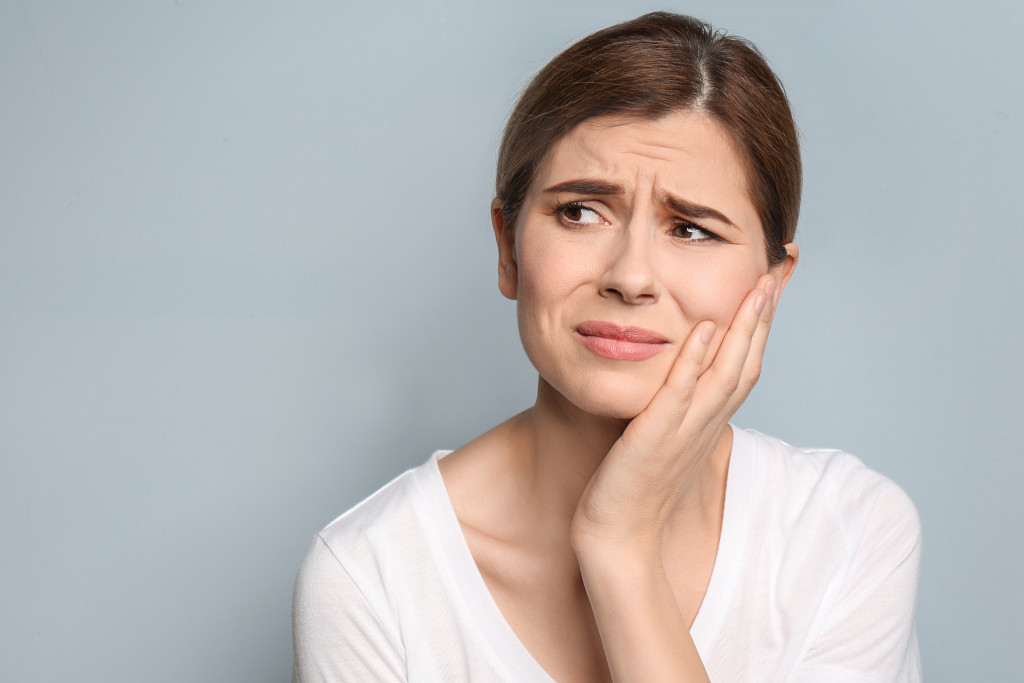- Poor oral hygiene, gingivitis, tooth sensitivity, hormonal changes, trauma, and wisdom teeth can cause gum pain.
- Maintaining oral hygiene, including brushing and flossing regularly, can prevent inflammation and pain in gums.
- Hormonal changes in women can cause gum inflammation; staying hydrated and maintaining oral hygiene can help.
- Trauma to the mouth and issues with wisdom teeth can lead to pain; immediate dental care is necessary.
- Preventive measures include a healthy diet, quitting smoking, and regular dentist visits to maintain oral health.
Gum pain can be an uncomfortable experience that can prevent you from enjoying your favorite foods and beverages. It can also lead to more severe dental problems like bleeding gums and tooth decay. Therefore, it’s essential to identify the causes of gum pain and know how to treat it properly. Here are some reasons you’re experiencing gum pain and ways to prevent it from happening.
1. Poor Oral Hygiene
The most common reason for gum pain is poor oral hygiene. When you don’t brush and floss properly, bacteria build up in your mouth, leading to gum disease. Gum disease causes inflammation and infection of the gums, leading to redness, soreness, and pain in the affected area. To prevent gum disease, brush twice daily, floss daily, and use an antimicrobial mouthwash as part of your dental routine.
2. Gingivitis
Gingivitis is the earliest stage of gum disease and is characterized by gum inflammation caused by bacteria and plaque buildup on your teeth. If not treated promptly, it can progress to periodontitis, a more severe form of gum disease leading to tooth loss. Common symptoms of gingivitis include swollen and tender gums, bad breath, and bleeding after brushing. To prevent gingivitis, maintain good oral hygiene habits and visit a dentist regularly for checkups and cleanings.

3. Tooth Sensitivity
Tooth sensitivity occurs when the tooth’s surface is worn down, exposing the dentin layer below, causing pain and discomfort when exposed to heat, cold, or acidic foods and beverages. This sensitivity can also affect the surrounding gums, leading to pain and sensitivity. To prevent tooth sensitivity, practice good oral hygiene, avoid acidic foods and beverages, and use a desensitizing toothpaste.
4. Hormonal Changes
For women, gum pain can also be caused by hormonal changes during menstruation, pregnancy, and menopause. These hormonal changes can cause gum inflammation and sensitivity, leading to pain and discomfort in the affected area. To alleviate hormonal-related gum pain, maintain good oral hygiene, and stay hydrated by drinking lots of water.
5. Trauma
Trauma to the mouth caused by injury, a fall, or a blow to the face can damage your teeth and gums, causing pain and discomfort. Trauma can result in dislodged teeth, broken or chipped teeth, and cut or bruised gums. If you experience any of these symptoms, seek dental care immediately.
6. Wisdom Tooth
Lastly, pain in the back of your mouth could be caused by wisdom teeth. Wisdom teeth are molars that typically emerge between the ages of 16 and 25. When these teeth don’t have enough room to grow, they can become impacted, leading to pain and swelling in the affected area. To prevent complications associated with wisdom teeth, visit a local wisdom teeth removal service for evaluation and treatment. Additionally, they can check for further complications related to your gum pain.
Prevention
There are various ways you can prevent this from happening. Here are three ways:

Healthy Diet
A healthy diet is crucial in preventing gum pain and maintaining oral health. Nutrient-rich foods provide the essential vitamins and minerals for healthy gums and teeth. Vitamins A and C, in particular, are critical for gum health. Vitamin A, found in foods like carrots, spinach, and sweet potatoes, helps maintain the soft tissue of the gums.
Vitamin C, found in citrus fruits, strawberries, and bell peppers, aids in collagen production, a protein that helps fight gum disease. Calcium-rich foods like milk, cheese, and leafy greens strengthen your teeth and help prevent gum diseases. On the other hand, limit your intake of sugary foods and drinks as they can lead to plaque build-up and subsequent gum diseases. Remember, a balanced diet leads to a healthy mouth and a brighter smile.
Quit Smoking
Smoking is detrimental to your health and this includes oral health. Smoking can cause dry mouth, making it difficult for saliva—the body’s natural defense against bacteria—to wash away plaque and food particles in the mouth. Additionally, smoking increases your risk of gum disease and oral cancer. You can reduce your risk of experiencing gum pain and other serious dental problems by quitting smoking.
Regular Dental Visits
Visiting your dentist regularly is another way to prevent gum pain. During your appointment, the dentist can check for signs of gum disease or other oral issues that can cause pain in the gums. They can also provide preventive care measures such as teeth cleanings and fluoride treatments to help keep your mouth healthy. In addition, they can give you advice on how to brush and floss properly and provide recommendations for products such as toothpaste, mouthwash, and toothbrushes.
By taking proper preventive measures, you can protect your teeth and gums from gum pain and other serious dental issues. Remember to practice good oral hygiene and quit smoking to keep your mouth and gums in tip-top shape. Doing so can help you avoid painful dental visits and keep your smile looking its best!